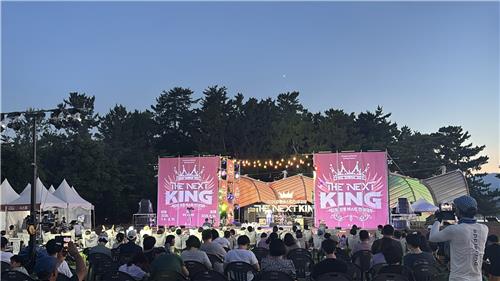Why is the 2nd Gangneung Busking National Contest drawing attention?
The site already hums with summer noise and expectation.
The event ran from June to August 2025 at Gyeongpo Lake Plaza, a popular lakeside park in Gangneung on South Korea’s east coast (Gangwon Province).
More than 600 teams—about 1,800 musicians—applied from across the country, and the top 150 finalists receive performance stipends and lodging support.
The overall winner earns 20 million won (about US$15,000) plus booking opportunities at city-sponsored festivals and events.
Audience reactions are quickly translated into scores during short sets.
Meanwhile, the live, informal feel of street performance (busking) clashes at times with the formalities of a competition.
Building on a successful inaugural edition in 2024, organizers upgraded sound systems, improved seating and strengthened operations this year.
However, those changes have sparked debate about whether formalizing busking alters its essential character.
What is at stake?
The question seems simple but the implications are broad.
The contest was launched to boost cultural life and draw tourists.
A multi-stage structure—preliminaries, semifinals and finals—offers clear opportunities for emerging musicians, but it also becomes a testing ground.
Audience voting now factors into judges’ scores, which increases engagement but raises concerns about popularity-driven results.
Operational burdens are also visible.
Reports cite difficulties managing large numbers of participants, instances of lost contact with entrants, and unclear judging criteria.
On the other hand, content rules limiting provocative or political material could collide with artists’ freedom of expression.
Thus the debate expands beyond simple support or opposition to questions about cultural policy, regional economics and the health of the local arts ecosystem.
What do supporters argue?
Optimists make a clear case.
Proponents say the contest stimulates local culture and brings tourists to Gangneung.
During the festival period, Gyeongpo Lake Plaza injects business into nearby shops, hotels and restaurants, producing measurable revenue for local merchants.
Supporters argue those economic ripple effects help justify cultural spending.
Furthermore, emerging musicians gain stage experience and greater visibility.
Providing stipends and lodging to the 150 finalists eases the financial strain on creators who might otherwise struggle to keep performing.
Introducing audience voting is praised as a way to expand civic participation and heighten showmanship.
Supporters also claim that, over time, this structure can strengthen a regional music scene rooted in local audiences and repeated performances.
Importantly, lessons learned from the first year have made this edition more professional.
Upgraded audio equipment, more comfortable seating and better safety measures all improve performance quality.
Therefore, supporters view the contest not as a purely commercial event but as a process for building cultural assets for the city.
What are the critics’ concerns?
There is an uncomfortable truth for opponents.
Busking’s core is spontaneity, improvisation and direct street-level exchange.
Competition, especially with large cash prizes, risks changing that DNA.
As commercial incentives grow, the autonomy of performances may shrink.
Criticism gets specific.
If audience votes count toward final scores, acts that can mobilize crowds are advantaged, which may favor flashier or more sensational performances.
Combined with municipal or sponsor preferences, this could privilege easily marketable acts over subtler artistic expression.
Also, rules that curb political or provocative content risk chilling performances that carry social messages.
Operational issues cannot be ignored either.
Poor participant communication—examples include missed calls or abrupt cancellations—undermines trust in the contest.
Moreover, the administrative and financial resources devoted to the event could be diverted from other local cultural projects.
Critics warn the contest could unintentionally stifle grassroots variety and organic cultural flows.
This debate ties into history.
Past examples show that when street arts become commercialized, some cultural losses can follow.
On the other hand, advocates cite benefits, which suggests the outcome depends heavily on how rules and governance are designed.
What adjustments are possible?
Practical fixes are available.
Enhancing transparency in judging and rebalancing the weight of audience votes are relatively quick remedies.
At the same time, revisiting content guidelines to respect freedom of expression while protecting public safety and order is advisable.
Organizers have indicated willingness to consider such adjustments.
Education programs and workshops offer another path.
Providing entrants with pre-event training on performance safety, copyright basics and audience engagement can raise overall quality.
Establishing regular communication channels between organizers, local officials and musicians would help resolve complaints more quickly.
These changes could help the contest evolve from a one-off event into a sustainable cultural platform.
Conclusion: what will it leave behind?
The key is balance.
The contest has public goals: energizing local culture and supporting new musicians.
However, pressures from competition and commercialization can erode the spontaneity that defines busking.
Therefore continuous improvement around three pillars—transparent governance, fair judging and protection of artistic freedom—is essential.
In short:
The Gangneung Busking National Contest can create opportunities for artists and boost the local music ecology.
On the other hand, the competition format may risk diluting the free spirit of street performance.
Resolving this requires ongoing dialogue among organizers, citizens and musicians.
Which side do you lean toward?
Do you prioritize the opportunities the contest provides, or the freedoms of street performance?
That choice could shape the future of local culture in Gangneung.

The 2nd Gangneung Busking National Contest, held June–August 2025 at Gyeongpo Lake Plaza, drew about 600 teams and 1,800 applicants and sparked both enthusiasm and debate.
One hundred fifty finalists received stipends and lodging; the winner earns 20 million won (~US$15,000) and festival booking opportunities.
Supporters emphasize regional cultural activation and help for emerging artists; critics warn of commercialization and limits on expression.
Greater transparency in judging, revised voting weights and pre-event education are among the practical steps proposed to strike a balance.